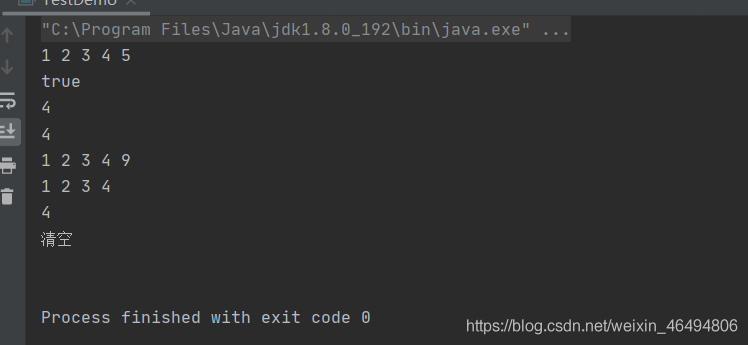Java實現一個順序表的完整代碼
實現一個順序表
接口實現
定義一個MyArrayList類,在類中實現以下函數
public class MyArrayList {
}
數組的定義
public int[] elem;//定義一個整形數組
public int usize;//usize表示數組的長度
public MyArrayList(){
this.elem = new int[5];
}
打印順序表
for循環打印順序表的每一位
public void display(){
for (int i = 0; i < this.usize; i++) {
System.out.print(this.elem[i]+" ");
}
System.out.println();
}
在pos位置新增元素
先定義一個isFull函數判斷順序表是否滿瞭,滿瞭返回true,沒滿則返回false
public boolean isFull(){
if (this.usize == this.elem.length){
return true;
}
return false;
}
將pos位置後的元素後移,順序表順序表長度增加一位
public void add(int pos, int data){
//判斷順序表是否滿瞭
if (isFull()){
System.out.println("順序表已滿");
//擴容
this.elem = Arrays.copyOf(this.elem,2*this.usize);
}
//判斷pos的合法性
if (pos < 0 || pos > this.usize){
System.out.println("pos位置不合法");
return;
}
//將pos位置後的數字後移
for (int i = this.usize-1; i >= pos; i--) {
this.elem[i+1] = this.elem[i];
}
this.elem[pos] = data;
this.usize++;
}
判定是否包含某個元素
public boolean contains(int key){
for (int i = 0; i < this.usize; i++) {
if (this.elem[i] == key){
return true;
}
}
return false;
}
查找某個對應元素的位置
返回它的位置
public int search(int key){
for (int i = 0; i < this.usize; i++) {
if (this.elem[i] == key){
return i;
}
}
return -1;
}
獲取pos位置的元素
定義一個isEmpty函數判斷順序表是否為空
public boolean isEmpty(){
return this.usize == 0;
}
public int getPos(int pos){
//判斷順序表是否為空
if (isEmpty()){
return -1;
}
//判斷pos 位置是否合法
if (pos < 0 || pos >= this.usize){
return -1;
}
return this.elem[pos];
}
給pos位置的元素設為value 更新為新的數字
public void setPos(int pos,int value){
//判斷順序表是否為空
if (isEmpty()){
return;
}
//判斷pos位置是否合法
if (pos < 0 || pos >= this.usize){
return;
}
this.elem[pos] = value;
}
刪除第一次出現的關鍵字key
查找到關鍵字,從關鍵字所在的位置開始到順序表結束每一項前移,覆蓋掉關鍵字,長度減少一位
public void remove(int key){
int index= search(key);
if (key == -1){
System.out.println("關鍵字不存在");
return;
}
for (int i = key; i < this.usize-1; i++) {
this.elem[i] = this.elem[i+1];
}
this.usize--;
}
獲取順序表長度
public int size(){
return this.usize;
}
清空順序表
順序表長度直接為0
public void clear(){
this.usize = 0;
}
實現這個順序表
定義一個測試類,測試這些函數的輸出
public class TestDemo {
public static void main(String[] args) {
MyArrayList myArrayList = new MyArrayList();
//給這個順序表寫入1,2,3,4,5
myArrayList.add(0,1);
myArrayList.add(1,2);
myArrayList.add(2,3);
myArrayList.add(3,4);
myArrayList.add(4,5);
//打印這個順序表
myArrayList.display();
//判定5這個元素是否在該順序表中
System.out.println(myArrayList.contains(5));
//查找5這個元素 返回它的位置
System.out.println(myArrayList.search(5));
//獲取3位置的元素
System.out.println(myArrayList.getPos(3));
//將4位置的元素重新賦值為9
myArrayList.setPos(4,9);
//打印新的順序表
myArrayList.display();
//刪除第一次出現的元素4
myArrayList.remove(4);
//打印新的順序表
myArrayList.display();
//獲取順序表的長度
System.out.println(myArrayList.size());
System.out.println("清空");
//清空順序表
myArrayList.clear();
//打印新的順序表
myArrayList.display();
}
}
得到結果:

順序表的優缺點
優點:順序表查找方便,知道這個元素的位置就可以直接找到這個元素。
缺點:擴容一般成2倍增長,會有一定的空間浪費。
推薦閱讀:
- None Found